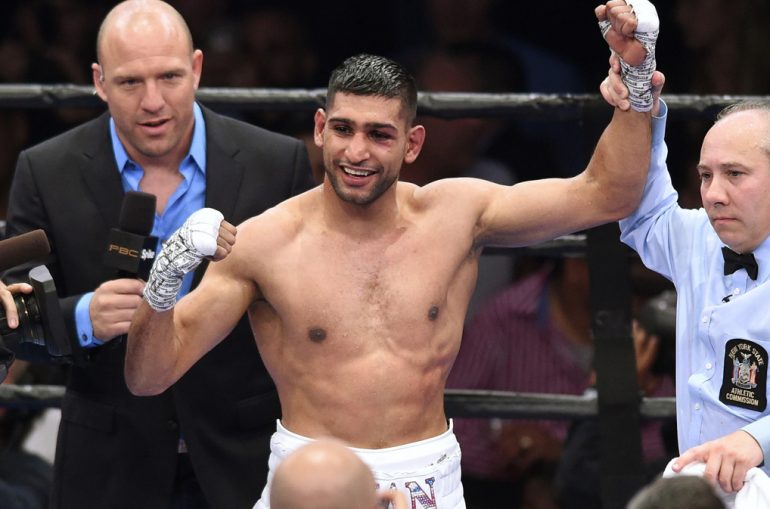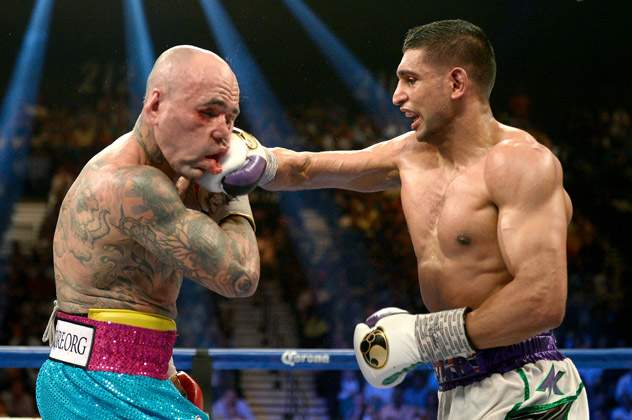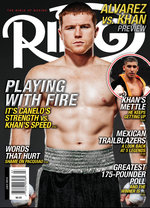Amir Khan: Vulnerable? Maybe. Persistent? Definitely.

THE FORMER 140-POUND TITLEHOLDER SAYS HE HAS EMERGED FROM HIS DISAPPOINTMENTS A BETTER FIGHTER
This story appears in the July 2016 edition of THE RING Magazine.
 Faith plays a significant role in Amir Khan’s life and appears in numerous guises. There is, for starters, his Islamic faith. A devout follower, Khan is accustomed to organizing fights around Ramadan, a month of fasting observed by Muslims worldwide. Then there’s the faith he has frequently shown in his own boxing ability, including the faith he displayed when, at the tender age of 17, he ventured to the 2004 Olympic Games in Athens and secured a silver medal against the odds. He has faith, also, in the idea that ups will invariably follow downs, that crushing defeats will lead to brighter days – world titles, no less – and that setbacks shouldn’t necessarily spell the end. Finally, and just as crucial, is Khan’s faith in his chosen path being the right one. After all, having spent years chasing a Floyd Mayweather Jr. superfight and then going after Manny Pacquiao before signing to fight Canelo Alvarez, some labeled him delusional and desperate. Others, meanwhile, said he should head back to England and cash in against Kell Brook. But, no, Amir Khan kept the faith. Just as he always has done.
Faith plays a significant role in Amir Khan’s life and appears in numerous guises. There is, for starters, his Islamic faith. A devout follower, Khan is accustomed to organizing fights around Ramadan, a month of fasting observed by Muslims worldwide. Then there’s the faith he has frequently shown in his own boxing ability, including the faith he displayed when, at the tender age of 17, he ventured to the 2004 Olympic Games in Athens and secured a silver medal against the odds. He has faith, also, in the idea that ups will invariably follow downs, that crushing defeats will lead to brighter days – world titles, no less – and that setbacks shouldn’t necessarily spell the end. Finally, and just as crucial, is Khan’s faith in his chosen path being the right one. After all, having spent years chasing a Floyd Mayweather Jr. superfight and then going after Manny Pacquiao before signing to fight Canelo Alvarez, some labeled him delusional and desperate. Others, meanwhile, said he should head back to England and cash in against Kell Brook. But, no, Amir Khan kept the faith. Just as he always has done.
“I’ve made a name for myself in America and I knew I’d be an attractive proposition for someone,” said Khan, who faces Alvarez on May 7 in Las Vegas. “I always had faith a big fight would come off, even when Mayweather retired.
“I’m now showing everyone there are plenty of guys who say they want to fight me but don’t really want to fight me. They’re the ones hiding behind excuses. I’m getting on with my career and taking the biggest and riskiest fights possible. I feel I deserve a big fight and deserve to be in a position to face the biggest names in boxing because I’m the one who has put my neck on the line, made the sacrifices and made it happen.”
Khan is currently training in San Francisco and growing bigger, stronger and bolder by the day. An unlikely RING and WBC middleweight championship fight with Alvarez, set for Sin City’s new T-Mobile Arena, will take place at a catchweight of 155 pounds, yet Khan has never officially fought at a weight higher than 147. He is, therefore, breaking new ground with this one. He’s sacrificing weight and time spent with loved ones in order to first secure and then win a superfight, something he has craved for so long, all the while knowing that having his name up in lights comes with a sizable health risk.
“It’s a fight I can lose and a fight where I might get hurt and never fight again,” concedes the former WBA and IBF world junior welterweight titleholder. “But I want to shut the doubters up. I know how good Alvarez is. I need an opponent like him. You need to know you’ve got a guy in front of you who is very tough and won’t allow you to make mistakes. That makes you work harder and stay focused. If I’ve got an easy opponent in front of me, my focus isn’t there. I’ve made that mistake in the past. I’ve gone into fights with no fear and found myself in trouble. But this is one fight I can’t take my eyes off. One mistake against Canelo and I could be badly hurt. It will hurt me physically and it could hurt my career, too. I know that. I have to be so smart and focused.”
Some people can suffer a defeat and it destroys them. It finishes them. They’re never the same. But I’ve used my defeats in a good way. I ask myself why I suffered the defeat and it helps me to improve. I’ve always tried to change something after a loss. – Amir Khan
Khan, by his own admission, hasn’t always been smart and focused; he’s been brave and brilliant. That much is beyond doubt. But oftentimes these same admirable traits have led to his downfall. Yes, an Olympic silver medal at 17, fresh out of high school, was a nod to prodigious talent and audacity, yet, on the flip-side, a 2008 defeat to unheralded Colombian Breidis Prescott was a damning indictment of youthful naivete. Prescott was 19-0 at the time, while Khan was 18-0, and the fight, over in just 54 seconds, stood not only as a first career setback but as a reason to doubt everything. Doubt the perfect record, doubt the Olympic pedigree, doubt the talent, doubt the potential, doubt the world title aspirations. Doubt it all.
“You always think nobody will beat you,” Khan said. “I was no different. I thought I’d be the best ever. Most fighters think the same. They all dream of being an undefeated champion.”
Khan, however, knew as early as fight No. 19 that this would never be the case.
“Even though I got beaten badly, I still had that belief,” he says. “I still thought I’d become a world champion. I just saw the loss to Prescott as a bump in the road.
“Some people can suffer a defeat and it destroys them. It finishes them. They’re never the same. But I’ve used my defeats in a good way. I ask myself why I suffered the defeat and it helps me to improve. I’ve always tried to change something after a loss.”
Now hamstrung by apparent fragility, Khan sucked it up, moved on from the Prescott disaster and, within three fights, had emphatically beaten Andreas Kotelnik to lift the WBA title, a belt he’d go on to successfully defend five times. Part of the reason for this turnaround, he believes, was moving to America – to train with Freddie Roach at Los Angeles’ Wild Card Boxing Club – and the serenity that ensued.

Amir Khan catches Luis Collazo en route to outpointing the veteran on May 3, 2014, in Las Vegas. Photo by Naoki Fukuda
“It was a massive sacrifice,” he said. “I left everything at home, including my family, and went off to train on my own. I was meeting new people and very few of them had heard of me. Nobody was looking to do me any favors or make it easy.
“I love England. England will always be home for me. Nothing will ever beat that. But I have had to get used to America. I’ve spent so much time over here now. Sometimes you miss your family and don’t really enjoy it but most of the time I try to make it good. Sometimes my dad comes out here and so does my wife and little baby girl. That makes it easier. I try to make it as fun as possible. But, look, it’s training – I know it can’t be too nice.”
It’s a fight I can lose and a fight where I might get hurt and never fight again. But I want to shut the doubters up. I know how good Alvarez is. I need an opponent like him. – Amir Khan
By way of initiation, Khan was beckoned into the Wild Card ring opposite Pacquiao, pound-for-pound superstar, for the first of many sparring sessions. The Bolton wanderer, still smarting from the Prescott loss, shrugged his shoulders, banged together a pair of oversized gloves and bit down on his mouthpiece. After that, away they went. Confidence and Khan reconnected.
“When I finally got into the ring with Manny, I just hit and moved, used my footwork and kept away,” he said. “I remember hitting him with two jabs – bang, bang – and knocking his head back. I thought to myself, ‘This is easier than I thought it would be.’ I thought he was going to be all over me. It was probably a good thing I was nervous beforehand because it kept me sharp. I was catching him with the kind of shots not many other sparring partners land on him. I was catching him with some really big shots.”
Sparring over, Pacquiao approached Khan, put a hand on his shoulder and said, “You were so quick, I couldn’t see your punches.” Khan smiled. Whether the comforting words of an elder statesman trying to make the newcomer fit in or a genuine, heartfelt assessment of potential, it sounded good to him. Roach, meanwhile, called the session a “cockfight.”
Whatever the correct term, whatever the agenda, it was a world away from the type of gym experience Khan was accustomed to back in England.
“We’d have British and Commonwealth champions, often junior middleweights or middleweights, coming to the gym and I’d just take them apart,” he said. “They would then not turn up the next day, or, if they did, it would just be to take a photograph with me. They had too much respect.”
Some fighters would relish such an environment, one that boosts their ego, one that solidifies their position as the gym alpha male, but Khan saw no sense in it. It would, he felt, only cultivate further bad habits and thus lead to further mistakes. There’d be another Prescott; he was sure of it. He had to get away. He had to escape.
So he did.
Some bad habits had formed already, however. A split-decision loss to Lamont Peterson in December 2012 and a fourth-round knockout loss to Danny “Swift” Garcia seven months later prompted further introspection and even greater adjustments.
“I think the hardest defeat was the Garcia one,” Khan said. “If I’d just stuck to my game plan instead of going in there and trying to knock Garcia out, I’d have won. But I fought the wrong fight, Garcia beat me and he’s become a massive name since. I helped him do that.
“That fight hurt me because I knew exactly what I did wrong and knew I could have prevented it. I know I wasn’t focused in training camp and didn’t prepare properly. I could have just boxed him. I was too macho. That happens sometimes when you’re young. You do stupid things.”
Faith, again. Khan has for years possessed immense (almost blind) faith in his ability to linger in punching range and overwhelm opponents with dazzling speed and combinations, even though critics, and sometimes past form, suggest his vulnerability at close quarters makes such logic utterly flawed. Garcia, more than anyone, proved this.
“I look back at the fight and think, ‘Why did I just stand with him and trade punches? Why, when I’m hurt, am I trying to swing back and hurt him rather than hold or move away?'” Khan said. “I’ve got great footwork, great movement, and I should have used it. Instead, I tried to be too macho and paid the price. Thankfully, I’m a much calmer fighter now. I don’t make those same mistakes.”
 Less indulgent, Khan still moves, more rapidly than most, but does so with a far greater sense of purpose and economy. He now performs moves for a reason. He gets busy on an opponent, often slashing his fists like Edward Scissorhands on a garden hedge, but then gets out in the nick of time, safe from harm. It’s easier this way, cleaner this way, and Virgil Hunter, his latest teacher, is seemingly the one responsible for curbing Khan’s enthusiasm.
Less indulgent, Khan still moves, more rapidly than most, but does so with a far greater sense of purpose and economy. He now performs moves for a reason. He gets busy on an opponent, often slashing his fists like Edward Scissorhands on a garden hedge, but then gets out in the nick of time, safe from harm. It’s easier this way, cleaner this way, and Virgil Hunter, his latest teacher, is seemingly the one responsible for curbing Khan’s enthusiasm.
“You see a fighter’s tendencies – both my guy and the other guy – and then you work the adjustments during the fight,” Hunter said. “There are certain things you can do to make the other guy pay for his mistakes but you need to be patient and you need to have method. If a dog is just biting you, you’ve got to move away from his jaws. We’re just moving away from the jaws now.”
So far, so good. He’s unbeaten in five since the “Swift” lesson.
“It’s funny,” Khan said, “when I was 25 I used to think I was mature and fully grown up. But, if I look back now and take into account everything I’ve learned since, I was still a boy then. I’m a lot more mature now. You see things differently. You do things differently. As I’ve got older I’ve started to take the sport more seriously. I’ve been away from home and have had to focus on training more. Outside the gym, I’m resting when I should be resting. That never used to happen when I was younger. I had too much energy for my own good and I’d try burning it all. Now I know how to conserve energy and use it the right way.”
Khan, at 17, was slimmer, leaner, slighter around the shoulders but also wonderfully innocent, ignorant, adventurous and ambitious.
“At 17 I felt I could beat everyone but didn’t really know how to go about doing it,” he said. “When everybody doubted me, I shocked them. I know I’ve still got the same determination and drive I had back then, but, with that drive and hunger, I’m also much smarter and know my strengths and weaknesses. I know what has worked and what hasn’t worked in my boxing career.
“There’s now more pressure on me than there’s ever been. I didn’t have pressure on me at 17 because nobody expected me to do anything at the Olympics. It’s different now, though. People want to see me win. People expect me to win.”
And yet few think Khan will triumph against Alvarez on May 7. When pressed for reasons why, they point to the obvious size difference and the supposed disparity in overall robustness. Khan feels it, too. He senses the doubters rehearsing their post-fight commiserations and he visualizes the smug smile on the face of Kell Brook, his principal U.K. rival. But then, during such moments, he casts his mind back to being 17 again, just as we all do from time to time, and everything seems all right in the world.
“I think going to the Olympics at 17 was a bigger task (than facing Canelo),” he said of the last time he was an underdog. “I’ve got people who expect me to win this fight. I’ve heard Roger Mayweather say I’ll win and a few other people in boxing as well. When I went to the Olympics, however, nobody expected me to win a fight, let alone a medal. Nobody even knew who I was.
“This fight with Canelo is different. I’ve been working towards this opportunity for over 10 years. I’m ready for it. When I beat Canelo, it will be the greatest moment in my boxing career. But I’ll never forget the Olympics. That’s what put me where I am today.”
It’s also what gives Virgil Hunter, a onetime admirer of the boy with the silver, total faith in the man now carrying out his instructions in pursuit of gold. “Amir proved at 17 it was in him,” he said. “We don’t have to guess. He went to the big stage at 17, a pup, and proved he had special quality in him. I know it’s there.”
















